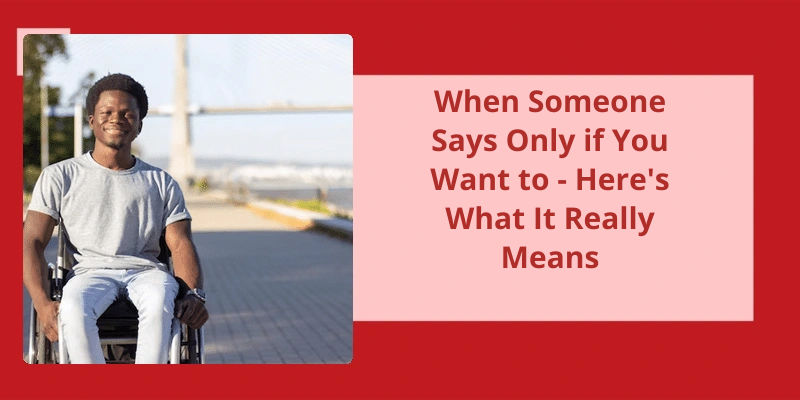It's a phrase that's become ubiquitous in our language, one that's often tossed out casually in conversation without much thought. When someone says "only if you want to," it's typically in response to a question or request, and is often used to give the other person an out: a way to politely decline without feeling guilty or obligated. At it’s heart, this phrase indicates a sense of permission, a recognition that ultimately, the decision is up to the person being asked. But though it’s intentions may be good, "only if you want to" can also be a loaded phrase, carrying with it a host of assumptions and expectations that can be difficult to navigate. So what does it really mean when someone says "only if you want to," and how should we interpret their response?
Why Do People Say if You Want?
Have you ever wondered why people say “if you want” when they make or agree to an offer or suggestion? Well, it turns out that saying “if you want” has many different meanings and applications depending on the context in which it’s used.
For example, when someone says “if you want” after offering something, it can mean that they’re giving the other person full control over the decision. Essentially, they’re saying that they’re okay with whatever the other person decides, whether they accept the offer or decline it.
For instance, if someone is trying to make a suggestion but theyre not sure if it’s a good idea, they might say something like “Well, we could try it, if you want” as a way of expressing their uncertainty. Similarly, if someone is hesitant to accept an offer, they might say “Im not sure, Ill think about it” followed by “if you want” to show that they need more time to make a decision.
Another reason why people say “if you want” is to soften the impact of a refusal. For instance, if someone is declining an offer or a suggestion, they might say “I appreciate the offer, but I think Ill pass, if you want” as a way to soften the blow and avoid hurting the other persons feelings. This phrase can help to make the refusal less abrupt, and it can also serve as a way to show appreciation for the other persons thoughtfulness.
For instance, if someone asks if they can take the last slice of pizza, the other person might say “Sure, if you want” as a way to give them permission. Similarly, if someone is considering doing something that might inconvenience someone else, they might say “Im thinking of taking a nap for an hour, if you want” as a way to let the other person know that they won’t be bothered.
It can convey respect, indecision, acceptance, or permission, depending on how it’s used. So the next time you hear someone say “if you want,” pay attention to the context and try to guess what they really mean.
Communication can be tricky, and sometimes what people say isn’t always what they mean. This is especially true when it comes to ambiguous phrases like “If you say so.” While it may seem like a simple affirmation, there can often be underlying nuances and implications that are easily missed. In this article, we’ll take a closer look at the true meaning of this phrase and how to navigate conversations when it’s used.
When a Guy Says if You Say So?
This phrase is often used as a way to avoid confrontation or disagreement. The speaker may have doubts or disagreements, but they don’t want to argue or create tension in the conversation. It’s a way of avoiding conflict and keeping the peace.
It’s important to recognize that when someone says “if you say so,” it doesn’t necessarily mean theyre dismissing what youre saying. It might just mean that they don’t have enough information to fully understand or believe what youre saying. In these cases, it can be helpful to provide more explanation or evidence to support your point.
It can imply that the speaker thinks the person theyre talking to is being foolish or naive. In these cases, it’s important to address the underlying issues of disrespect and lack of trust in the relationship.
Ultimately, “if you say so” is a phrase that can have different meanings depending on the context and tone of the conversation. It’s important to pay attention to nonverbal cues and tone of voice to fully understand the message being conveyed. Communication is a two-way street and requires active listening and empathy to ensure a productive conversation.
It’s a nuanced phrase that requires careful consideration of the context and tone of the conversation. By actively listening and engaging in open and respectful communication, we can ensure that were truly understanding and connecting with the people in our lives.
Conclusion
In conclusion, the phrase "only if you want to" holds immense power in both personal and professional interactions. It serves as a gentle reminder that one always has the freedom to choose, without unnecessary pressure or obligation from anyone else. It also cultivates a respectful and considerate tone in communication, which can foster positive and healthy relationships. Whether it's an invitation, a suggestion or a request, adding "only if you want to" can truly make a difference in how others perceive and respond to us. Ultimately, it highlights the importance of autonomy and consent, and the value of treating others with kindness and empathy.






